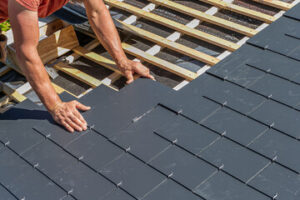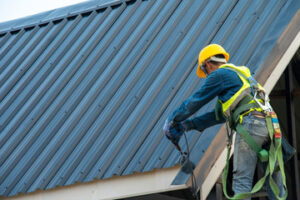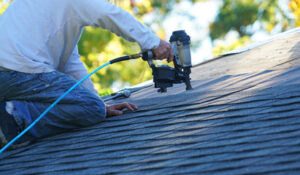Erie Shingles are a key element of any roof, and they can be made of many different materials. Choosing the right type of shingle for your home requires balancing factors like local climate, budget and aesthetic preferences.

Asphalt shingles, for example, offer a sleek look with great durability, while cedar shingles are the choice of homeowners seeking natural beauty and character.
Felt roof shingles are an affordable and effective option for protecting garden buildings, sheds, summer houses, beach huts and more. They offer good weather protection and can be easily installed by professional roofers or DIYers with basic roofing skills. Unlike a traditional slate roof, felt roof shingles don’t require an additional finishing layer, saving time and resources. Felt shingles are also available in self-adhesive varieties, which makes them even easier to install.
In the past, builders used to install a sheet of felt paper under roof shingles during construction. The purpose of this underlayment is to create a layer of protection between the wood roof deck and the shingles. Although many building inspectors now question the importance of this underlayment, it still provides a layer of moisture protection, especially if it is left undisturbed once the shingles are in place. It is also important for safety reasons as it offers roof workers a layer of traction to prevent falls, especially if the roof is wet.
Nevertheless, it is important to note that felt underlayment doesn’t last as long as shingles or other roof coverings. This is because felt ages very quickly and can deteriorate over time, especially if it is exposed to the sun for extended periods of time. It can also become brittle and prone to tearing under intense pressure. However, the lifespan of felt underlayment can depend on several factors, including the material used and the environmental conditions.
Nevertheless, despite the fact that shingles are more expensive than felt, they offer better durability and a higher level of weather protection. Moreover, shingles come in a variety of colours and styles to suit any aesthetic preference. Therefore, if you’re not worried about the look of your shed’s roof and want to get maximum protection from the British weather, then shingles may be the perfect solution for you.
Metal
Metal shingles offer homeowners a fusion of durability and elegance. They excel in withstanding harsh weather elements like hail, snow, and strong winds. They also resist fire and rot, making them the perfect choice for residential roofs. With a variety of color and design options, this roofing system can easily match the aesthetic of any home. It is important to follow maintenance guidelines to ensure optimal performance and longevity.
Many homeowners are tired of the short lifespans and ordinary looks of asphalt shingle roofs. Others are dissatisfied with mold, mildew, and other deterioration that can compromise the integrity of their homes. Additionally, they do not want to deal with the high cost of replacing a traditional shingle roof every few years.
A growing number of homeowners are turning to metal roof shingles as an alternative to traditional shingle roofs. These durable shingles are designed to mimic the appearance of traditional roofing materials such as wood, slate, and clay. They can be made of various metals, including galvanized steel and aluminum. Unlike standing seam or corrugated metal roofs, these shingles are not manufactured in large sheets but rather in small, shingle-like forms.
Some metal shingles are designed with reflective coatings that help to reduce the amount of energy used in heating and cooling their homes. This can result in significant savings on energy costs. These shingles also help to cut down on pollution by reducing the need for air conditioning and heating systems.
Another benefit of this type of roof is that it can increase the resale value of a home. The attractive appearance of a metal shingle roof can make a property stand out from the competition, attracting buyers and increasing the likelihood of a successful sale.
EDCO’s line of metal shingle roofs includes a variety of designs and styles. For example, the Villa Tile Stone Coated Shingle XD reflects the Mediterranean style and offers an elegant look. It is available in five different colors and features an aluminum-zinc alloy coated 26 gauge steel and 3M ceramic-coated stone granules. In addition, the shingles are low-maintenance and rust-resistant. They also have a UL 2218 impact rating, ensuring safety and security.
Asphalt
Asphalt roof shingles are one of the most popular roofing materials for home construction, and they’re known for their durability, energy efficiency, and cost effectiveness. They are also easy to maintain and offer a wide range of color options, which gives homeowners the ability to customize their home’s aesthetic. However, asphalt shingles are vulnerable to damage from harsh weather conditions and must be properly maintained to ensure their longevity.
The main component of asphalt shingles is fiberglass mat, which is bonded together with asphalt and other chemicals to create the shingle. The mat is then covered with mineral granules, which serve to protect the asphalt from ultraviolet radiation and improve its strength and resistance to wind. The granules can be made from several different materials, including crushed stone, silica, and recycled rubber. In addition to their structural properties, the granules can be designed to repel algae growth and reduce the risk of discoloration.
There are a number of different types of asphalt shingles available to home builders, including strip and laminated dimensional shingles. The strip shingle is the most basic option and features a single layer with cutouts that form three tabs. It is thinner and less expensive than a laminated shingle. The latter type has more layers of shingle material bonded together and offers a higher level of protection.
The disadvantages of an asphalt shingle roof include its lower level of wind resistance and its vulnerability to moss and algae growth. Because of these drawbacks, a homeowner should have their shingles inspected regularly by a professional roofing company. These experts can look for signs of shingle wear and tear, such as missing shingles or sagging areas, as well as inspect the structure of the roof to make sure it is secure and watertight.
The lifespan of an asphalt shingle roof is usually 30 to 50 years. The lifespan of a roof can be extended by regular maintenance, such as checking for damage, cleaning the surface to remove debris, and removing any moss or algae. A professional roofing company can recommend the best maintenance procedures for your roof.
Wood
Depending on the color and stain you choose, wood roof shingles add a warm and classic look to any home. Typically made from cedar, they can also be coated with a variety of paint colors and stains including butternut, slate gray, russett brown and redwood to complement any architectural style. Because shingle colors can fade over time, regular re-staining is essential for long term maintenance.
Cedar shingles are very strong and will last the life of your roof. However, their lifespan can be affected by weather conditions like wet winters and hot summers, as well as exposure to sun’s UV rays. The sturdiness of wood shingles is also affected by the slope of your roof, since it is easier for rain water to drain off sharp slopes than gradual ones.
Wood shingles offer great insulation to help reduce energy costs for your home. Additionally, they are environmentally friendly and can be recycled after their use is finished. The downside of using a wood shingle is the increased cost and maintenance needs to keep it in good condition.
Those looking to add a unique look to their homes can choose rived shingles. These shingles are hand split and crafted to give them a rougher texture. While they can be a great accent to your home, shakes and rived shingles are not recommended for steep roofs due to their tendency to catch on fire.
Some shake and shingle types are cut with an edge grain, which is done to ensure stability and longevity. Others are cut with a flat grain, which is done to save money but can lead to the formation of mold and harbor moisture.
While a non-combustible roof and thirty feet of vegetation clearance can increase the chances of structural survivability during a wildfire, the reality is that wildfires can happen anywhere. While many homeowners would rather not take this risk, if the choice is between a non-combustible roof or a set of wooden shingles, the latter is the more attractive option.
Wood shingles are not as durable as other roofing materials, but still do provide an excellent level of protection for your home or business. They are susceptible to weathering and rot and must be regularly treated to avoid damage. They also need to be properly nailed and secured in place to prevent warping and other issues.


